The Philadelphia Phillies are a professional baseball team based in Philadelphia, Pennsylvania. They are a member of the National League (NL) East Division in Major League Baseball (MLB). Their home stadium is Citizens Bank Park, located in the South Philadelphia Sports Complex, and has been since 2004.
1900: Phillies Losing Streak Record
In 1961, the Phillies lost 23 games in a row. This losing streak remains the worst in the major leagues since 1900.
1901: No City Series
In 1901, no City Series was held due to legal conflict between the National and American Leagues.
1901: Players Defect to the American League
In 1901, with the rise of the American League, the Phillies lost many of their better players, including some to their crosstown rivals, the Athletics.
1902: No City Series
In 1902, no City Series was held due to legal conflict between the National and American Leagues.
1903: Baker Bowl Balcony Collapse
In 1903, a balcony collapsed during a game at the Baker Bowl, resulting in 12 fatalities and hundreds of injuries, forcing Rogers to sell the Phillies.
1903: Start of the City Series
In 1903, the City Series began between the Philadelphia Athletics and the Phillies.
1903: Phillies Became a Major League Team
In 1980, the Phillies won their first World Series, becoming the last of the 16 teams that made up the Major Leagues from 1903 to 1960 to win a World Series.
1904: First 100-Loss Season
In 1904, the Phillies finished with a record of 52–100, marking the first time in franchise history they lost 100 games.
1915: First Pennant Win
In 1915, the Philadelphia Phillies won their first National League pennant, led by the pitching of Grover Cleveland Alexander and the hitting of Gavvy Cravath. However, the Phillies lost the World Series to the Boston Red Sox four games to one.
1915: National League Pennant
In 1915, the Philadelphia Phillies won their first National League pennant.
1916: Near Pennant Win
In 1916, the Phillies finished two and a half games out of first place, failing to capture a second consecutive pennant. Alexander won his second consecutive triple crown and posted 16 shutouts, tying the single-season major league record.
1918: Start of Futility Era
In 1918, following the Alexander trade, the Phillies finished sixth, marking the start of a long period of futility.
1923: Stadium Renamed Baker Bowl
In 1923, the Philadelphia Base Ball Grounds were renamed the Baker Bowl.
1925: Sheep Used to Trim Grass
Until 1925, the Phillies used a flock of sheep to trim the grass at Baker Bowl.
1926: Right Field Grandstand Collapse
In 1926, the entire right field grandstand collapsed at the Baker Bowl, forcing the Phillies to move to the A's Shibe Park for 1927.
1927: Temporary Move to Shibe Park
In 1927, after the collapse of the right field grandstand at Baker Bowl, the Phillies temporarily moved to the A's Shibe Park.
1930: William Baker's Death
In 1930, owner William Baker died, leaving half his estate to his wife and half to longtime team secretary Mae Mallen.
1930: Record Runs Surrendered
In 1930, the Phillies surrendered 1199 runs, setting a major-league record that still stands today.
1932: Chuck Klein wins MVP Award
In 1932, Chuck Klein won the Most Valuable Player Award.
1932: Nugent Takes Complete Control
In 1932, after Baker's widow died, Gerald Nugent gained complete control of the Phillies.
1932: Winning Record Season
In 1932, during a long stretch of futility, the Phillies had their only winning record between 1918 and 1948.
1933: Chuck Klein's Triple Crown
In 1933, Chuck Klein won the Triple Crown.
July 10, 1936: Chuck Klein hits four home runs in a game
On July 10, 1936, Chuck Klein hit four home runs in one game at Forbes Field in Pittsburgh.
1938: Both Teams Played at Shibe Park
From 1938, both the Philadelphia Phillies and the Philadelphia Athletics played at Shibe Park.
1938: Permanent Move to Shibe Park
In 1938, the Phillies moved permanently to Shibe Park after the city threatened to condemn the Baker Bowl.
1939: By Saam begins broadcasting for the Phillies
In 1939, By Saam began broadcasting for the Phillies, a role he held until 1975.
1941: Franchise Record for Losses
In 1941, the Phillies finished with a 43–111 record, setting a franchise record for losses in a season.
March 15, 1943: Team Purchased by William D. Cox
On March 15, 1943, lumber baron William D. Cox purchased the team with a group of investors for $190,000 and a $50,000 note, ending the Nugent era.
November 23, 1943: Cox Banned and Team Sold to Carpenter
On November 23, 1943, William D. Cox was banned from baseball for betting on the Phillies, and the team was sold to Bob Carpenter Sr., scion of the Delaware-based duPont family for an estimated $400,000. Carpenter Sr. named his son, Bob Carpenter, Jr., team president.
1943: Team Put Up For Sale
In 1943, Nugent put the Phillies up for sale due to a lack of funds to operate the team.
1944: Blue Jays Nickname Contest
Before the 1944 season, the Phillies held a fan contest and chose "Blue Jays" as an additional nickname for the team. Elizabeth Crooks won a $100 war bond for submitting the name.
1946: Addition of Minor League Clubs
Before the start of the 1946 season, the Philadelphia Phillies added three minor league clubs, naming them all Blue Jays: the Class C Salina Blue Jays, Class C Schenectady Blue Jays and Class D Green Bay Blue Jays.
1946: Uniforms similar to cream-colored uniforms introduced
From 1946 through 1949, uniforms similar to the cream-colored uniforms introduced in 2008 were worn.
1948: End of Futility Era
From 1918 to 1948, the Phillies had only one winning record, signaling a long streak of futility for the team.
1949: Uniforms similar to cream-colored uniforms introduced
From 1946 through 1949, uniforms similar to the cream-colored uniforms introduced in 2008 were worn.
1949: First Division Appearance in 31 Years
In 1949, the Phillies rocketed up the standings to third place with an 81–73 record, marking their first appearance in the first division in 31 years. Bob Carpenter Sr. died in June, leaving Bob Jr. in full control of the team.
1949: Unpopularity of Blue Jays Moniker
The Blue Jays moniker was ultimately unpopular and, according to news reports at the time, was not officially dropped by the team until January 1950.
January 1950: Official Drop of Blue Jays Moniker
In January 1950, the Philadelphia Phillies officially dropped the Blue Jays moniker, which "never caught on anyway".
1950: Jim Konstanty wins MVP Award
In 1950, Jim Konstanty won the Most Valuable Player Award.
1950: World Series Loss
In 1950, The Phillies, as the "Whiz Kids", earned themselves a World Series appearance. However, the Philadelphia Athletics finished last, and longtime manager Connie Mack retired.
1950: Whiz Kids' Pennant Win
In 1950, the "Whiz Kids" led the National League standings for most of the season. Despite a late-season slump, Dick Sisler's home run clinched the Phillies' first pennant in 35 years. However, they were swept by the New York Yankees in the World Series.
1950: Athletics Finished Last
In 1950, the Philadelphia Athletics finished last, and longtime manager Connie Mack retired.
1951: The Phillies finished with a 73–81 record
In 1951, The Phillies finished with a 73–81 record.
1952: The Phillies finished nine and a half games out of first place
In 1952, The Phillies finished nine and a half games out of first place, with an 87–67 record.
1953: Shibe Park Renamed Connie Mack Stadium
In 1953, Shibe Park was renamed Connie Mack Stadium in honor of longtime Philadelphia Athletics manager Connie Mack.
1953: The Phillies managed to end up in third place
In 1953, The Phillies managed to end up in third place, with an 83–71 record.
1954: Start of Sub-.500 Seasons
In 1954, the Phillies began a streak of sub-.500 seasons that lasted until 1957.
1955: End of the City Series
In 1955, the City Series came to an end after the Philadelphia Athletics moved to Kansas City, Missouri.
1955: Athletics Move to Kansas City
In 1955, the Philadelphia Athletics moved to Kansas City after being sold to the Johnson brothers. The Phillies bought Shibe Park as part of the deal.
1956: Don Larsen's Perfect Game
In 1956, Don Larsen threw a perfect game in the World Series, referenced because in 2022 the Astros threw a combined no-hitter in Game 4, the second no-hitter of any type in a World Series.
1957: Jack Sanford wins Rookie of the Year
In 1957, Jack Sanford won Rookie of the Year honors.
1957: End of Sub-.500 Seasons Streak
In 1957, the Phillies' streak of sub-.500 seasons ended.
1958: Start of Last Place Finishes
In 1958, the Phillies began a streak of finishing in last place in the National League, lasting until 1961.
1960: Sawyer Quits, Mauch Takes Over
In 1960, manager Eddie Sawyer abruptly quit the team after the season opener and was replaced by Gene Mauch.
1960: Phillies Became a Major League Team
In 1980, the Phillies won their first World Series, becoming the last of the 16 teams that made up the Major Leagues from 1903 to 1960 to win a World Series.
1961: Phillies Losing Streak
In 1961, the Philadelphia Phillies experienced a significant setback, losing 23 consecutive games. This losing streak remains the worst in the major leagues since 1900, highlighting a period of competitive difficulty for the team.
1961: End of Last Place Finishes
The Phillies ended a streak of finishing in last place in the National League in 1961.
1962: Bill Campbell begins broadcasting for the Phillies
In 1962, Bill Campbell began broadcasting for the Phillies, a role he held until 1970.
1962: Phillies Finish Above .500
In 1962, the Phillies had a turnaround, finishing above .500 for the first time in five years. Gene Mauch was also named National League Manager of the Year that season.
1963: Richie Ashburn begins broadcasting for the Phillies
In 1963, Richie Ashburn began broadcasting for the Phillies, a role he held until 1997.
1963: Phillies Improved Record
In 1963, the Phillies improved their performance, finishing the season with a record of 87 wins and 75 losses, leading to increased confidence about the team's potential to contend for the World Series.
1964: Jim Bunning's Perfect Game
In 1964, Jim Bunning pitched a perfect game against the New York Mets on Father's Day, marking the first perfect game in Phillies' history.
1964: Phillies Collapse
In 1964, despite a strong lead of 6.5 games with 12 to play, the Phillies lost 10 consecutive games and ultimately missed the pennant by one game, losing to the St. Louis Cardinals. This collapse is remembered as one of the worst in sports history and is known as the "Phold of '64".
1964: Phillies Sold Connie Mack Stadium
In 1964, the Phillies' owner sold Connie Mack Stadium to Philadelphia Eagles' owner Jerry Wolman for a $1 million loss.
1966: Phillies Finish Fourth in NL Standings
In 1966, the Philadelphia Phillies finished no higher than fourth place in the National League standings, reflecting a period of moderate performance for the team.
1967: Attendance Drop and Stadium Planning
By 1967, the Phillies faced declining attendance at Connie Mack Stadium, which led the team to begin planning for the construction of a new stadium.
1969: National League Splits into Two Divisions
After the National League split into two divisions in 1969, the Phillies and the Pirates remained together.
1969: "Whiz Kids" era ends
In 1969, the uniforms and logo used were very similar to those used during the "Whiz Kids" era, which lasted from 1950 to 1969.
1969: Phillies Finish Fifth in NL East Division
In the 1969 season, the Philadelphia Phillies concluded their season in fifth place within the newly formed National League East Division, recording a season record of 63 wins and 99 losses.
1969: Start of the Divisional Era
Since the start of the Divisional Era in 1969, the Phillies have emerged as one of MLB's most successful teams.
1970: Burgundy Color Scheme Adopted
From 1970 to 1991, the Phillies adopted a dark burgundy as the main team color with a classic pinstripe style for home uniforms.
1970: Bill Campbell ends broadcasting for the Phillies
In 1970, Bill Campbell ended his broadcasting career for the Phillies, after beginning in 1962.
1970: Last Game at Connie Mack Stadium
In 1970, the Phillies played their last game at Connie Mack Stadium, avoiding last place by defeating the Expos 2–1. After the game, fans removed items from the ballpark.
1971: Harry Kalas begins broadcasting for the Phillies
In 1971, Harry Kalas began broadcasting for the Phillies, a role he held until 2009.
1971: Rick Wise's No-Hitter and Harry Kalas Joins Broadcasting
In 1971, Rick Wise pitched a no-hitter and hit two home runs in the same game against the Cincinnati Reds. Also in 1971, Harry Kalas joined the Phillies broadcasting team.
1971: Opening of Veterans Stadium
In 1971, the Phillies inaugurated the new Veterans Stadium in South Philadelphia, a move that marked the team's first relocation away from North Philadelphia. They also introduced new maroon uniforms to signify the change.
1972: Pale Blue Away Game Uniforms Introduced
From 1972 to 1988, a pale blue (as opposed to traditional grey) was used as the base-color for away game uniforms.
1972: Dan Baker becomes PA announcer
In 1972, Dan Baker started as the Phillies' public-address announcer, becoming the longest-tenured PA announcer in Major League Baseball.
1972: Ruly Carpenter Takes Control of Team
In 1972, Ruly Carpenter was given control of the Philadelphia Phillies when his father stepped down as team president.
1972: Steve Carlton wins Cy Young Award
In 1972, Steve Carlton won his first Cy Young Award.
1972: Steve Carlton Wins Cy Young Award, Bob Carpenter Jr. Retires
In 1972, despite the Phillies being the worst team in baseball, Steve Carlton won nearly half their games and was awarded his first NL Cy Young Award. Bob Carpenter Jr. retired and passed team ownership to his son Ruly in 1972 as well.
1974: Phillies Above .500
The 1985 season was the first time the Phillies finished below .500 since 1974.
1975: By Saam ends broadcasting for the Phillies
In 1975, By Saam ended his broadcasting career for the Phillies, after beginning in 1939.
April 17, 1976: Mike Schmidt hits four home runs in a game
On April 17, 1976, Mike Schmidt hit four home runs in one game at Wrigley Field in Chicago.
1976: Phillies Win Division Title, Lose NLCS
In 1976, the Phillies won the division title but lost in the NLCS against the Cincinnati Reds.
1977: Steve Carlton Wins Second Cy Young Award
In 1977, Steve Carlton was awarded his second NL Cy Young Award, recognizing his exceptional performance as a pitcher for the Philadelphia Phillies.
1977: Phillies Adopt Batting Practice Jersey
In 1977, the Phillies were an early adopter of the batting practice jersey, wearing a maroon v-necked top with the "Phillies" script name across the chest, as well as the player name and number on the back and a player number on the left sleeve, all in white.
1977: Phillies Win Division Title, Lose NLCS
In 1977, the Phillies won the division title but lost in the NLCS against the Los Angeles Dodgers.
1977: Toronto Blue Jays Start Play
In 1977, the Toronto Blue Jays started play in MLB, using the same moniker that the Phillies had previously used.
1977: Burt Hooton's poor performance during the NLCS
Los Angeles Dodgers pitcher Burt Hooton's poor performance during game three of the 1977 NLCS has often been attributed to the crowd's taunting.
1978: Phillie Phanatic introduced
In 1978, the Phillie Phanatic mascot was introduced, and has been called "baseball's best mascot".
1978: Phillies Wall of Fame started
In 1978, the Phillies Wall of Fame was started as the Philadelphia Baseball Wall of Fame.
1978: Phillies Win Division Title, Lose NLCS
In 1978, the Phillies won the division title but lost in the NLCS against the Los Angeles Dodgers.
May 19, 1979: Phillies Wear "Saturday Night Specials"
On May 19, 1979, the Phillies wore all-burgundy uniforms with white trimmings, called "Saturday Night Specials", for the first and last time in a 10–5 loss to the Montreal Expos. The uniforms were negatively received and abandoned.
1979: Phillies Acquire Pete Rose
In 1979, the Phillies acquired Pete Rose, which was seen as a crucial addition to elevate the team's performance and competitiveness.
1980: Mike Schmidt wins MVP Award
In 1980, Mike Schmidt won the Most Valuable Player Award.
1980: Tug McGraw's victory parade quote
In 1980, during the victory parade after the World Series, Tug McGraw told New York fans they could "take this championship and shove it."
1980: World Series Championship
In 1980, the Philadelphia Phillies won their first World Series championship, defeating the Kansas City Royals.
1980: Phillies Win World Series
In 1980, the Phillies won a World Series title while wearing the burgundy uniform style and color motif.
1980: Phillies Win National League East and NLCS
In 1980, the Phillies won the National League East and then defeated the Houston Astros in a memorable NLCS, marked by multiple extra-inning games. Garry Maddox's 10th-inning hit secured the win, leading to the city's first NL pennant in 30 years.
1980: Mike Schmidt Retirement
In 1989, Mike Schmidt retired from baseball after playing in only 42 games, marking the departure of the last member of the 1980 championship team.
1981: Mike Schmidt wins MVP Award
In 1981, Mike Schmidt won his second consecutive Most Valuable Player Award.
1981: Sale of the Phillies
In 1981, Ruly Carpenter sold the Phillies for $32.5 million to a group headed by William Yale Giles.
1981: Nationals defeat the Phillies in the NLDS
In 1981, the Nationals, then known as the Montreal Expos, defeated the Phillies 3-2 in the NLDS.
1981: Phillies Return to Playoffs
In 1981, the Phillies returned to the playoffs but were defeated by the Montreal Expos in the National League Division Series. Mike Schmidt won his second consecutive NL Most Valuable Player award that year.
1982: Steve Carlton wins Cy Young Award
In 1982, Steve Carlton won his fourth Cy Young Award.
1982: Carlton Wins Fourth Cy Young Award
In 1982, the Phillies narrowly missed the playoffs, finishing three games behind the St. Louis Cardinals. Steve Carlton captured his fourth career NL Cy Young Award with 23 wins.
1983: John Denny wins Cy Young Award
In 1983, John Denny won the Cy Young Award.
1983: Phillies Make World Series Appearance
In 1983, the Phillies made another World Series appearance while wearing the burgundy uniform style and color motif.
1983: Phillies Win NL Pennant, Lose World Series
In 1983, the Phillies returned to the playoffs and won the NL pennant by beating the Los Angeles Dodgers in four games. However, they lost to the Baltimore Orioles in the World Series in five games. John Denny was named the 1983 NL Cy Young Award winner.
1983: Phillies select Centennial Team
In 1983, the Phillies selected their Centennial Team to commemorate the best players of the first 100 years in franchise history, instead of inducting a player into the Wall of Fame.
1984: Phillies Finish Fourth in NL East
In 1984, the Phillies finished fourth in the NL East with a record of 81–81. Mike Schmidt led the National League in both home runs and runs batted in.
1984: Phillies Phestival started
Since 1984, the Phillies have supported ALS research with the "Phillies Phestival".
1985: Phillies Finish Below .500
The 1985 season was the first time the Phillies finished below .500 since 1974.
1986: Mike Schmidt wins MVP Award
In 1986, Mike Schmidt won his third Most Valuable Player Award.
1986: Phillies Finish Second in Division, Mike Schmidt Wins MVP
In 1986, the Phillies finished second in the division with a record of 86–75, despite releasing star pitcher Steve Carlton due to injuries. Mike Schmidt led the National League in home runs and runs batted in, and also won his third National League Most Valuable Player award, sixth Silver Slugger award, and tenth Gold Glove.
1987: Steve Bedrosian wins Cy Young Award
In 1987, Steve Bedrosian won the Cy Young Award.
1988: Pale Blue Away Game Uniforms Discontinued
From 1972 to 1988, a pale blue (as opposed to traditional grey) was used as the base-color for away game uniforms. In 1988, the uniforms were discontinued.
1988: Mike Schmidt Misses Most of Season Due to Injuries
In 1988, Mike Schmidt missed most of the season due to injuries, impacting his playing time and the team's dynamics.
1989: Mike Schmidt Retirement
In 1989, Mike Schmidt retired from baseball after playing in only 42 games, marking the departure of the last member of the 1980 championship team.
1990: Terry Mulholland's No-Hitter
In 1990, Terry Mulholland lost a perfect game in the seventh inning due to a throwing error but was credited with a no-hitter.
1991: End of Burgundy Color Scheme Era
From 1970 to 1991, the Phillies sported colors, uniforms, and a logo that were noticeably different. In 1991, the burgundy color scheme was dropped.
1992: Uniform and Logo Change, Last Place Finish
Before the 1992 season, the Phillies changed their uniform and logo colors, using colors similar to those used during the days of the "Whiz Kids". The season ended with the Phillies in last place in the National League East.
1992: Current team colors, uniform, and logo introduced
In 1992, the Phillies' current team colors, uniform, and logo were introduced. The main colors are red and white, with blue as an accent. The home uniform is white with red pinstripes, and the road uniform is grey with red lettering. The hats are red with a stylized "P". These uniforms and logos are similar to those used during the "Whiz Kids" era from 1950 to 1969.
1993: End of Two-Division Play Era
During the period of two-division play (1969–1993), the Phillies and Pirates won the highest numbers of division championships, reigning exclusively as NL East champions in the 1970s and again in the early 1990s.
1993: Phillies Win NL Pennant, Lose World Series
In 1993, the Phillies beat the Atlanta Braves in the National League Championship Series to earn their fifth NL pennant. They were defeated by the Toronto Blue Jays in the World Series, with Joe Carter hitting a walk-off home run in Game 6.
1993: Scott Rolen Drafted
In 1993, the Phillies drafted third baseman Scott Rolen in the second round of the amateur draft.
1993: "Macho Row" and Fan Attendance
In 1993, the Phillies were led by stars such as Darren Daulton, John Kruk, Lenny Dykstra, and Curt Schilling. The team was dubbed "Macho Row" for their shaggy, unkempt, and dirty look. Their character endeared them to fans, and attendance reached a record high the following season.
1993: Larry Bowa Hired as Manager
In 2001, Larry Bowa was hired as manager and led the Phillies to an 86–76 record, their first winning season since the 1993 World Series year. Bowa was named National League Manager of the Year.
1993: World Series Loss to Toronto
Nearly 50 years after the Phillies used the Blue Jays moniker, those Blue Jays defeated the Phillies in six games in the 1993 World Series.
1993: MLB Strike
The 1994–95 Major League Baseball strike was a blow to attendance and on-field success, as was the arrival of the Atlanta Braves in the division due to league realignment. Several players from the 1993 team were either traded or left the team soon after.
1994: Pirates Move to National League Central
After the Pirates moved to the National League Central in 1994, the rivalry with the Phillies diminished.
1994: All-Blue Caps Introduced and Compromise Reached
In 1994, the Phillies introduced all-blue caps on Opening Day, to be worn for home day games only. After player complaints, a compromise was reached where the players would wear them for weekday games and return to red caps for Sunday afternoon games. The Phillies wore the "unlucky" blue caps for seven games in 1994, losing six.
1994: MLB Strike
The 1994–95 Major League Baseball strike negatively impacted attendance and on-field success for the Phillies.
1996: Phillies Draft Core Players
Between 1996 and 2002, the Phillies drafted players who would soon become the core of the team including Jimmy Rollins, Pat Burrell, Chase Utley, Ryan Howard, and Cole Hamels.
1996: Scott Rolen Reaches Majors
By 1996, Scott Rolen had reached the major leagues, marking a significant step in his professional baseball career.
1997: Introduction of Interleague Play
In 1997, Interleague Play was introduced, allowing the Phillies and Athletics to face each other, though the rivalry had largely died.
1997: Richie Ashburn ends broadcasting for the Phillies
In 1997, Richie Ashburn ended his broadcasting career for the Phillies, after beginning in 1963.
1997: Scott Rolen Named Rookie of the Year
In 1997, Scott Rolen was named National League Rookie of the Year, recognizing his outstanding performance in his debut season.
1997: Phillies draft J. D. Drew
J. D. Drew was the Phillies' first overall draft pick in the amateur draft of 1997.
August 1999: Fans throw debris at J. D. Drew
In August 1999, Phillies fans threw debris, including two D batteries, at J. D. Drew during a game, angered that he never signed with the team.
2001: Larry Bowa Hired as Manager
In 2001, Larry Bowa was hired as manager and led the Phillies to an 86–76 record, their first winning season since the 1993 World Series year. Bowa was named National League Manager of the Year.
December 6, 2002: Jim Thome Signs with Phillies
On December 6, 2002, Jim Thome signed a six-year, $85 million contract with the Phillies, marking a significant acquisition for the team.
2002: Phillies Draft Core Players
Between 1996 and 2002, the Phillies drafted players who would soon become the core of the team including Jimmy Rollins, Pat Burrell, Chase Utley, Ryan Howard, and Cole Hamels.
2002: Harry Kalas receives the Ford Frick Award
In 2002, Harry Kalas received the Ford Frick Award.
2002: Scott Rolen Traded to the St. Louis Cardinals
In 2002, Scott Rolen was traded to the St. Louis Cardinals after requesting a trade due to frustration with management.
September 28, 2003: Larry Christenson Wears Burgundy Uniform at Veterans Stadium Closing Ceremony
On September 28, 2003, during the closing ceremonies at Veterans Stadium, Larry Christenson wore the old burgundy uniform in a procession of former players.
2003: Departure from Veterans Stadium
In 2003, the Phillies played their last game at Veterans Stadium.
2003: Phillies Winning Month
In 2008, the Phillies managed their first winning opening month since 2003, and only their fourth since their last World Series appearance.
2004: Charlie Manuel Takes Over as Manager
After the 2004 season, Charlie Manuel took over as the club's manager from Larry Bowa.
2004: Move to Citizens Bank Park
In 2004, the Philadelphia Phillies moved to their new home stadium, Citizens Bank Park, located in the South Philadelphia Sports Complex.
2004: Wall of Fame located in Ashburn Alley
In 2004, the Wall of Fame was located in Ashburn Alley at Citizens Bank Park.
2004: Change to the Wall of Fame inductions
Since 2004, the Phillies have only inducted one Phillie annually to the Wall of Fame.
November 2005: Pat Gillick Replaces Ed Wade
In November 2005, Pat Gillick replaced Ed Wade as the general manager of the Phillies, reshaping the club with his own player acquisitions.
2005: Charlie Manuel begins managing the Phillies
In 2005, Charlie Manuel began his tenure as the Phillies' manager, a role he held until 2013.
2005: Ryan Howard wins Rookie of the Year
In 2005, Ryan Howard won Rookie of the Year honors.
2005: The Montreal Expos relocate to Washington DC
In 2005, the Montreal Expos relocated to Washington D.C., increasing geographic tension in their rivalry with the Phillies.
2006: Ryan Howard wins MVP Award
In 2006, Ryan Howard won the Most Valuable Player Award.
2006: Rivalry with Mets Intensifies
Since 2006, the Phillies and the Mets have battled for playoff position, intensifying their rivalry.
November 29, 2007: Phillies Announce Cream-Colored Uniforms
On November 29, 2007, the Phillies announced an alternate, cream-colored uniform for home day games, a tribute to their 125th anniversary. Jimmy Rollins, Cole Hamels, and Robin Roberts modeled the new uniforms.
2007: Jimmy Rollins wins MVP Award
In 2007, Jimmy Rollins won the Most Valuable Player Award.
2007: Rollins Wins MVP, Phillies Lose 10,000th Game and Win Division
In 2007, Jimmy Rollins won the NL Most Valuable Player award. The Phillies lost their 10,000th game but responded by winning the National League East division title, though they were swept by the Colorado Rockies in the Division Series. Brad Lidge was acquired through a trade after the season.
2007: Division Titles Streak Begins
The Phillies began a streak of five consecutive divisional titles between 2007 and 2011.
2007: Phillies Win Eastern Division Title
The Phillies' 2007 Eastern Division Title was won on the last day of the season as the Mets lost a seven-game lead with 17 games remaining.
2008: Phillies Phestival raises over $750,000
At their 2008 festival, the Phillies raised over $750,000 for ALS research.
2008: Utley and Lidge All-Stars, Blanton Trade
In 2008, Chase Utley and Brad Lidge represented the Phillies at the Major League Baseball All-Star Game. On July 17, the Phillies traded for Joe Blanton to bolster their starting rotation.
2008: Pat Gillick retires
In 2008, Pat Gillick retired as the general manager of the Phillies and was succeeded by Rubén Amaro Jr.
2008: Mets Contend for Playoffs
In 2008, The Mets contended for the playoffs with the Phillies.
2008: Blue Cap with Red Bill Introduced
In 2008, a slightly different blue cap (with a red bill) was introduced as part of the alternate home uniform for day games, a throwback to the late 1940s.
2008: World Series Championship
In 2008, the Philadelphia Phillies won their second World Series championship, defeating the Tampa Bay Rays.
2008: Phillies win the 2008 World Series
In 2008, the Phillies clinched the National League East for the second consecutive year, defeated the Milwaukee Brewers in the NLDS, and the Dodgers in the NLCS. They advanced to the 2008 World Series against the Tampa Bay Rays, winning the series 4 games to 1 and capturing their second World Series title. Cole Hamels won the Most Valuable Player Award for both the NLCS and the World Series.
2008: Phillies Introduce Cream-Colored Uniforms
In 2008, the Phillies introduced an alternate, cream-colored uniform during home day games, a tribute to their 125th anniversary. The uniforms are similar to those worn from 1946 through 1949, featuring red lettering bordered with blue piping and lacking pinstripes. The accompanying cap is blue with a red bill and a red stylized "P".
2008: Phillies Named Favorites
In 2008, the Phillies were named by some media outlets as favorites to repeat as division champions.
April 13, 2009: Death of Harry Kalas
Harry Kalas, Phillies broadcaster, died on April 13, 2009.
July 26, 2009: Phillies wear 2008 World Champions patches
From Opening Day through July 26, 2009, the Phillies wore 2008 World Champions patches on the right sleeve of their home uniforms to celebrate their World Series victory the season prior.
September 30, 2009: Phillies clinch third consecutive NL East Division title
On September 30, 2009, the Phillies clinched their third consecutive National League East Division title, a feat they had not achieved since the 1976-78 seasons.
December 16, 2009: Phillies Acquire Roy Halladay
On December 16, 2009, the Phillies acquired starting pitcher Roy Halladay from the Toronto Blue Jays for three minor-league prospects, and traded Cliff Lee to the Seattle Mariners for three prospects.
2009: Phillies last played in Philadelphia for the World Series
In 2009 was the last time before the 2022 World Series that the Phillies played the World Series at home in Philadelphia. In 2022, the Astros won the series four games to two.
2009: Phillies defeated in 2009 World Series
In 2009, the Phillies were defeated by the New York Yankees in the World Series, four games to two.
May 29, 2010: Roy Halladay pitches perfect game
On May 29, 2010, Roy Halladay pitched a perfect game against the Florida Marlins.
June 2010: Phillies host Toronto Blue Jays for series due to G-20 Summit
In June 2010, the Phillies hosted their scheduled series against the Toronto Blue Jays at Citizens Bank Park instead of Rogers Centre due to security concerns for the G-20 Summit. The Blue Jays wore their home uniforms and batted last, and the designated hitter was used, marking the first time a designated hitter was used in a National League ballpark during a regular-season game; Ryan Howard was the first player to fill the role.
August 19, 2010: Phillies surpass 100 consecutive sellouts
On August 19, 2010, the Phillies surpassed 100 consecutive sellouts.
2010: Roy Halladay wins NL Cy Young Award
In 2010, Roy Halladay was named the National League Cy Young Award winner.
2010: Roy Halladay throws no-hitter in NLDS Game 1
In 2010, during Game 1 of the National League Division Series, Roy Halladay threw a no-hitter against the Cincinnati Reds, leading the Phillies to a 4-0 victory. It was the second no-hitter in MLB postseason history and the fifth time a pitcher has thrown two no-hitters in the same season.
2010: Phillies win fourth consecutive NL East Division championship
In 2010, the Phillies won their fourth consecutive NL East Division championship despite injuries to key players, finishing with an MLB-best record of 97-65.
April 3, 2011: Attendance record broken
On April 3, 2011, the team broke the three-game series attendance record at the ballpark, having 136,254 fans attend the opening weekend against the Houston Astros.
September 17, 2011: Phillies win fifth consecutive East Division championship
On September 17, 2011, the Phillies won their fifth consecutive East Division championship.
2011: Phillies Win Consecutive Division Titles
From 2007 to 2011, the Phillies won five consecutive division titles.
2011: Phillies win NL East for the fifth consecutive year
From 2007 to 2011, the Phillies won the NL East five years in a row.
2011: Phillies lead the league in attendance
In 2011, the Phillies led the league in attendance with 3,680,718 fans.
2011: Video system upgraded at Citizens Bank Park
In 2011, the Phillies spent $10 million to upgrade the video system at Citizens Bank Park, including a new display screen in left field, making it the largest in the National League.
2011: Harry Kalas statue unveiled
In 2011, the Phillies unveiled a statue of Harry Kalas at Citizens Bank Park, funded by Phillies' fans.
2011: Playoff Drought Ends
In 2011, was the last year before 2022 that the Phillies reached the playoffs.
2011: Division Titles Streak Ends
The Phillies ended a streak of five consecutive divisional titles in 2011, which started in 2007.
2012: Phillies slump, miss postseason
In 2012, the Phillies experienced an up and down season. Key players Shane Victorino and Joe Blanton were traded to the Los Angeles Dodgers, and Hunter Pence was traded to the San Francisco Giants before the trade deadline. A loss to the Washington Nationals on September 28 ended the Phillies' postseason hopes for the first time since 2006.
2012: Phillies lead the league in attendance
In 2012, the Phillies led the league in attendance with 3,565,718 fans.
August 16, 2013: Charlie Manuel fired as manager
On August 16, 2013, with the team's record at 53-68, the Phillies fired manager Charlie Manuel, who had managed the team since 2005, and promoted third-base coach Ryne Sandberg to interim manager.
2013: Charlie Manuel's last season as Phillies' manager
2013 was Charlie Manuel's last season as the Phillies' manager. He managed 1,416 games during his tenure.
2014: Athletics do not acknowledge the City Series history
In 2014, when the Athletics faced the Phillies in Oakland, they did not acknowledge the historical connection, even hosting a Connie Mack promotion the day before the series.
2014: Phillies finish last in NL East
In the 2014 season, the Phillies finished last in the NL East for the first time since 2000.
August 2015: Philadelphia Phillies' UK Facebook group started
In August 2015, a Philadelphia Phillies' UK Facebook group was started.
2015: Sandberg Resigns as Manager
In 2015, Pete Mackanin was brought in as interim manager after Sandberg resigned as manager. General manager Rubén Amaro Jr. was fired and Andy MacPhail was brought in as the interim general manager.
2016: Phillies Add Red Alternate Uniform
In 2016, the Phillies added a red alternate uniform, similar to their spring training uniforms, to be used for mid-week afternoon games.
2016: Phillies broadcasts discontinued on WPHT 1210
In 2016, the Phillies' broadcasts were discontinued on WPHT 1210, the former AM flagship station.
2016: Howard and Ruiz's last season
The 2016 season was the last for both Ryan Howard and Carlos Ruiz in a Phillies' uniform.
May 2017: UK Phillies' Twitter account created
In May 2017, a UK Phillies' Twitter account was created.
September 29, 2017: Pete Mackanin Fired as Manager
On September 29, 2017, Pete Mackanin was fired as manager of the Phillies.
October 30, 2017: Phillies announce Gabe Kapler as new manager
On October 30, 2017, the Phillies announced Gabe Kapler as their new manager.
November 2017: WIP-FM changes ownership
In November 2017, WIP-FM (94.1 FM), the Phillies' flagship radio station, changed ownership from CBS Radio to Audacy.
2017: Red Alternate Uniform Unofficially Retired
Following the 2017 season, the red alternate uniform was unofficially retired, and the Phillies revived their powder blue throwbacks as an alternate uniform for select Thursday home games.
2017: Wall of Fame located in Ashburn Alley
In 2017, the Wall of Fame was located in Ashburn Alley at Citizens Bank Park.
2017: No inductee for the Wall of Fame
In 2017, there was no inductee for the Wall of Fame, as Pete Rose's planned induction was cancelled due to controversial allegations.
March 2018: Phillies' France account launched
In March 2018, a Phillies' France account was launched in French.
2018: Wall of Fame relocated to a new plaza
In 2018, the Wall of Fame exhibit was moved to a new plaza between the left-field scoreboard and the left-field entrance of the stadium.
July 27, 2019: Phillies Wear "Saturday Night Specials" Again for 40th Anniversary
On July 27, 2019, the Phillies wore the "Saturday Night Specials" jersey again for the 40th anniversary of the original game. They lost to the Atlanta Braves 15–7.
October 10, 2019: Gabe Kapler fired as manager
On October 10, 2019, Phillies owner John Middleton fired Manager Gabe Kapler after ten days of intense deliberations.
October 24, 2019: Joe Girardi announced as new manager
On October 24, 2019, the Philadelphia Phillies announced Joe Girardi as their 55th manager of the team.
2019: Bryce Harper signs with the Phillies
In 2019, Bryce Harper signed a 13-year, $330 million contract with the Phillies as a free agent, which further fueled tensions with the Washington Nationals.
October 3, 2020: Matt Klentak relieved as General Manager
On October 3, 2020, Matt Klentak was relieved as General Manager of the Phillies.
December 11, 2020: Dave Dombrowski Hired as President of Baseball Operations
On December 11, 2020, the Phillies hired Dave Dombrowski as the President Of Baseball Operations.
December 22, 2020: Sam Fuld Hired as General Manager
On December 22, 2020, Dave Dombrowski hired Sam Fuld as the General Manager of the Phillies.
2020: "Cut Out Overdoses" anti-drug campaign
In 2020, the "Cut Out Overdoses" anti-drug campaign, sponsored by MAPDA and Emergent Biosolutions, was featured at Citizens Bank Park, which was fan-empty due to the coronavirus pandemic, featuring "cut-out" cardboard figures of fans filling the stands. Clicking on one of the silhouettes leads to the anguished story of the overdose death of an individual, written by family members.
2021: Phillies Finish with Winning Record, Harper Wins MVP
In 2021, the Phillies finished the season with an 82–80 record, their first winning season since 2011, though they failed to make the playoffs. Bryce Harper won the NL Most Valuable Player Award and a Silver Slugger Award.
2021: Red Alternate Uniform Brought Back
In 2021, the red alternates were brought back for select road games, becoming the team's preferred uniform during "getaway day" road games.
2022: Phillies fire manager and reach playoffs
In 2022, the Phillies had a slow start to the season with a 22-29 record. On June 3, they fired manager Joe Girardi and replaced him with Rob Thomson as interim manager. The Phillies finished the 2022 season with an 87-75 record, making the playoffs for the first time since 2011.
2022: Phillies induct two members to the Wall of Fame
In 2022, the Phillies inducted two members to the Wall of Fame.
2022: Phillies Advance to World Series
In the 2022 postseason, the Phillies won the National League Wild Card Series against the St. Louis Cardinals and defeated the Atlanta Braves in the National League Division Series. They then won the National League Championship Series against the San Diego Padres, advancing to the 2022 World Series. Bryce Harper was named MVP of the NLCS. On October 10, Rob Thomson's interim role was removed and he was named the team's manager.
2022: Phillies Display Player Number on Sleeve Until 2022
Until 2022, the Phillies were the only team that also displayed the player's number on one sleeve, except on the alternate jersey, in addition to the usual placement on the back of the jersey.
2023: Phillies Retire Red Alternate Uniforms
After the 2023 season, the Phillies retired the red alternates in anticipation of a new City Connect uniform.
2023: Phillies induct three members to the Wall of Fame
In 2023, the Phillies inducted three members to the Wall of Fame.
2023: Left field display screen upgraded
In 2023, the Phillies upgraded their left field display screen by installing a 4K HDR screen that is 77% larger than the previous one.
2023: Phillies' Sleeves Left Blank
Since 2023, the sleeves on the Phillies' primary uniforms were left blank in anticipation of a future uniform advertisement.
2024: Phillies' broadcast details
As of 2024, WIP-FM is the Phillies' flagship radio station, and NBCUniversal handles local television broadcasts through NBC Sports Philadelphia/Peacock and WCAU.
2024: 2024 Season Record
As of the end of the 2024 season, the Phillies have played 21,648 games, with a regular season record of 10,207–11,326–115 (.474).
2024: Phillies and Mets First Playoff Meeting
In 2024, the Phillies and Mets had their first playoff meeting in the National League Division Series, where the Mets won the series 3-1. Nick Castellanos had a walk off base hit to win game two for the Phillies at home.
2024: Phillies Unveil Independence Blue Cross (IBX) as Uniform Advertiser
In 2024, the Phillies unveiled Independence Blue Cross (IBX) as the team's first uniform advertiser.
2024: Phillies Unveil City Connect Uniform
In 2024, the Phillies unveiled a new City Connect uniform. The primarily light blue/midnight blue gradient uniform with yellow trim was heavily inspired by the flag of Philadelphia's colors, with "Philly" emblazoned on the chest. The cap has a Liberty Bell silhouette with a light blue sky and midnight blue skyline, centered alongside two yellow stars. The Phillies wore their City Connect uniforms for 12 Friday night home games.
2024: Uniform Changes with Nike Vapor Premier Uniform
In 2024, when Nike changed the league's uniforms to the Vapor Premier uniform, the Phillies' wordmark crest was changed to a tackle twill patch style, ending the use of chain stitching in their chest emblems.
Mentioned in this timeline
Facebook is a social media and networking service created in...
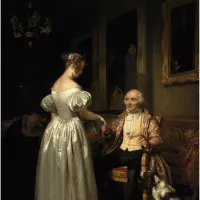
Father's Day is a celebration dedicated to honoring fathers fatherhood...

Los Angeles is the most populous city in California and...
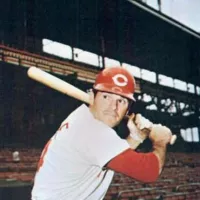
Pete Rose nicknamed Charlie Hustle was a prominent MLB player...

News encompasses information about current events disseminated through various media...
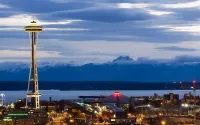
Seattle is the most populous city in Washington state and...
Trending
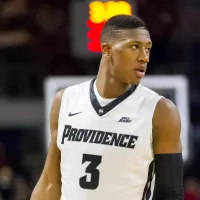
36 minutes ago Kris Dunn Shines: Steals the Show with Impressive Defensive Performance for Clippers
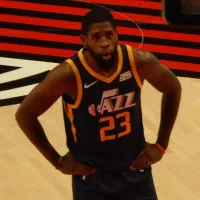
36 minutes ago Queta's Hilarious Clip Evokes Mazzulla Memories: A Lighthearted NBA Moment
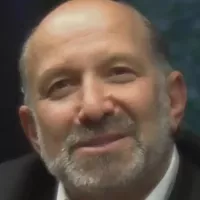
36 minutes ago Howard Lutnick faces potential subpoena in Epstein investigation, House Republicans consider deposition.
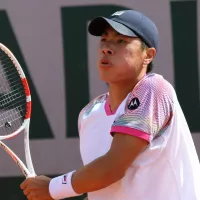
37 minutes ago Nakashima at Acapulco Open 2026: Match Predictions and Results Analysis.
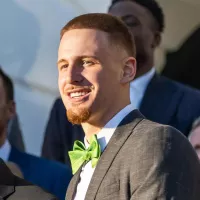
37 minutes ago Donte DiVincenzo's Underrated Impact on Timberwolves: A Deep Dive into His Contributions
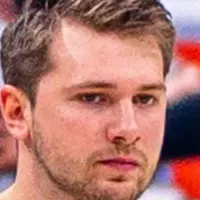
37 minutes ago Luka Don?i?'s Botched Play and Sam Mitchell's Criticism Doom Lakers Against Magic
Popular

Jesse Jackson is an American civil rights activist politician and...

Susan Rice is an American diplomat and public official prominent...

Barack Obama the th U S President - was the...

XXXTentacion born Jahseh Dwayne Ricardo Onfroy was a controversial yet...

Michael Joseph Jackson the King of Pop was a highly...

Kashyap Pramod Patel is an American lawyer who became the...